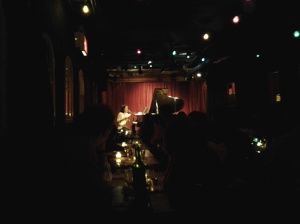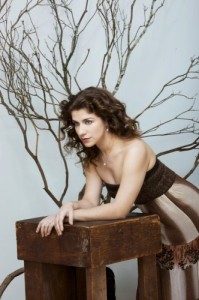Inna Faliks–A Night of Words and Music at Cornelia: A Review
Music/Words
presents
Inna Faliks (piano)
Clarice Assad (piano and vocals)
Samantha Malk (soprano)
and Irina Mashinski (poet)
Cornelia Street Cafe, NYC
April 22nd, 2012
Written by Kyle Lynch
Last Sunday evening, pianist Inna Faliks closed the fourth season of her Music/Words series at the West Village institution, Cornelia Street Café, in New York City. It was an intimate affair in the Café’s cozy basement theatre, and Inna was joined by soprano Samatha Malk, Brazilian pianist and singer Clarice Assad, and poet Irina Mashinski. The potpourri of solo piano, songs, and poetry readings hearkens back to old European salons of the turn of the century. Yet the evening was thoroughly enjoyable and modern.
Irina Mashinski set the mood of the first half of the concert with the opening poem “The Room” preceding piano works by Ludwig van Beethoven and Arnold Schoenberg. In the poem, a lady carefully furnishes and arranges a room—only to prepare for “an explosion.” Beethoven’s Fantasia in G minor, op. 77 presents a loose set of variations that continually drifts abroad to far reaching keys, different tempos and moods. If Beethoven was preparing later generations of composers to push the limits of tonality, then Schoenberg set the explosion of tonality with the early atonal work, Three Pieces for Piano, op. 11, when he “emancipated the dissonance” the year before in 1908.
Inna Faliks played with sensitivity, bringing out the lyricism and power in both pieces, and also highlighted the wry humor and abrupt shifts in Fantasia in G minor. A rarer side of Schoenberg was heard with a smattering of early songs. Influenced by the lieder of Gustav Mahler, these songs were filled with lush romantic yearnings and enchanting forest scenes. Samantha Malks sang with a clear tone and warmth, particularly in a stirring performance of “Waldesnacht”. Three selections from Schoenberg’s cabaret songs, Brettl-Lieder, were also delightfully presented. A solo piano transcription by Franz Liszt of an art song by Frederic Chopin, “The Wish”, created an effective transition between the two sets of Schoenberg songs. Ms. Faliks deftly performed it charm and ebullience.
Irina Mashinski interspersed her poems between the movements and pieces. She created a synergy of mood by selecting poems to match the music. For Schoenberg’s Three Pieces, Ms. Mashinski described scenes of urban destruction and apocalyptic anxiety, such as depictions of the legendary sunken city of Atlantis. In another poem, “The End of the World”, someone ignores recent, tragic news by burying the newspaper in a trash can—only to expect the end of the world for each following day. The audience, perhaps overwhelmed by the angst stirred up from the poems and Schoenberg’s atonal moodiness, only first applauded midway through the concert after the mood lightened with Schoenberg’s early songs. Such can be the enveloping power of music and poetry. Any remaining tension disappeared after the applause, and the performers appeared gratified to receive the recognition.
 The evening was capped off by Clarice Assad with a different sort of music. Steeped in the tradition of Brazilian popular music, Ms. Assad began singing “Falsa Baiana” while tapping out a samba rhythm on a pandeiro (a kind of Brazilian tambourine), before turning to the piano. She improvised fluidly throughout her set before ending with the Italian standard “Senza Fine”. It was a wonderful way to finish a concert that began so earnestly—journeying from intense dread to a song about unceasing love.
The evening was capped off by Clarice Assad with a different sort of music. Steeped in the tradition of Brazilian popular music, Ms. Assad began singing “Falsa Baiana” while tapping out a samba rhythm on a pandeiro (a kind of Brazilian tambourine), before turning to the piano. She improvised fluidly throughout her set before ending with the Italian standard “Senza Fine”. It was a wonderful way to finish a concert that began so earnestly—journeying from intense dread to a song about unceasing love.
